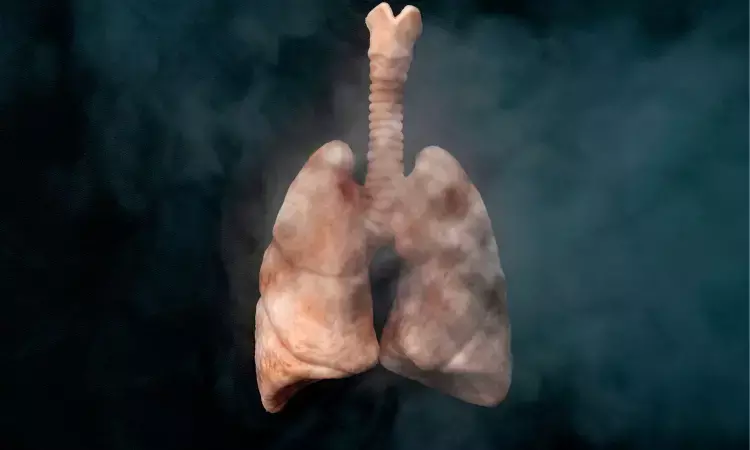- Home
- Medical news & Guidelines
- Anesthesiology
- Cardiology and CTVS
- Critical Care
- Dentistry
- Dermatology
- Diabetes and Endocrinology
- ENT
- Gastroenterology
- Medicine
- Nephrology
- Neurology
- Obstretics-Gynaecology
- Oncology
- Ophthalmology
- Orthopaedics
- Pediatrics-Neonatology
- Psychiatry
- Pulmonology
- Radiology
- Surgery
- Urology
- Laboratory Medicine
- Diet
- Nursing
- Paramedical
- Physiotherapy
- Health news
- Fact Check
- Bone Health Fact Check
- Brain Health Fact Check
- Cancer Related Fact Check
- Child Care Fact Check
- Dental and oral health fact check
- Diabetes and metabolic health fact check
- Diet and Nutrition Fact Check
- Eye and ENT Care Fact Check
- Fitness fact check
- Gut health fact check
- Heart health fact check
- Kidney health fact check
- Medical education fact check
- Men's health fact check
- Respiratory fact check
- Skin and hair care fact check
- Vaccine and Immunization fact check
- Women's health fact check
- AYUSH
- State News
- Andaman and Nicobar Islands
- Andhra Pradesh
- Arunachal Pradesh
- Assam
- Bihar
- Chandigarh
- Chattisgarh
- Dadra and Nagar Haveli
- Daman and Diu
- Delhi
- Goa
- Gujarat
- Haryana
- Himachal Pradesh
- Jammu & Kashmir
- Jharkhand
- Karnataka
- Kerala
- Ladakh
- Lakshadweep
- Madhya Pradesh
- Maharashtra
- Manipur
- Meghalaya
- Mizoram
- Nagaland
- Odisha
- Puducherry
- Punjab
- Rajasthan
- Sikkim
- Tamil Nadu
- Telangana
- Tripura
- Uttar Pradesh
- Uttrakhand
- West Bengal
- Medical Education
- Industry
Forceps biopsy and cryobiopsy equally effective for diagnosing lung lesions

Forceps biopsy and cryobiopsy are recently recognised as innovative auxiliary techniques to EBUS-TBNA for mediastinal sampling. Nevertheless, it remains unclear which of the two techniques is the superior match for standard needle biopsy.
EBUS-TBNA(Endobronchial ultrasound-guided transbronchial needle aspiration) is the standard for lung cancer staging, but due to retrieval of limited tissue, its diagnostic utility may be hampered. Recent evidence suggests forceps biopsy and cryobiopsy as auxiliary techniques for larger diagnostic samples.
According to a study published in Pulmonology, “Transbronchial mediastinal cryobiopsy might be a promising tool to supplement traditional needle biopsy for increased diagnostic yield and tissue harvesting.”
This study aimed to assess the usefulness of forceps biopsy and cryobiopsy in diagnosing mediastinal diseases. Patients with 1 cm or more lesions were enrolled, and after needle aspiration, three forceps biopsies and one cryobiopsy were performed randomly. The primary outcomes were diagnostic yield (percentage of patients with a definite diagnosis) and complications related to the procedure.
Key results of this study are:
· A total of 155 patients were enrolled in the study and assigned randomly.
· The addition of either forceps biopsy or cryobiopsy to EBUS-TBNA led to an increased diagnostic yield, with no significant difference between the two methods (EBUS-TBNA plus forceps biopsy and EBUS-TBNA plus cryobiopsy (85.7 % versus 91.6 %).
· However, samples obtained through cryobiopsy were more suitable for lung cancer molecular testing than forceps biopsy samples (100.0 % versus 89.5 %).
· Overall, the diagnostic yield of cryobiopsy was superior to forceps biopsies (85.7 % versus 70.8 %).
· Cryobiopsies also produced more samples in a shorter time than forceps biopsies.Two cases of postprocedural pneumothorax were identified.
Our results suggest that mediastinal cryobiopsy might be a suitable complementary approach to traditional needle sampling, they said.
Reference:
Tian, C. et al. Comparison of cryobiopsy and forceps biopsy for the diagnosis of mediastinal lesions: A randomised clinical trial. Pulmonology.
BDS, MDS in Periodontics and Implantology
Dr. Aditi Yadav is a BDS, MDS in Periodontics and Implantology. She has a clinical experience of 5 years as a laser dental surgeon. She also has a Diploma in clinical research and pharmacovigilance and is a Certified data scientist. She is currently working as a content developer in e-health services. Dr. Yadav has a keen interest in Medical Journalism and is actively involved in Medical Research writing.
Dr Kamal Kant Kohli-MBBS, DTCD- a chest specialist with more than 30 years of practice and a flair for writing clinical articles, Dr Kamal Kant Kohli joined Medical Dialogues as a Chief Editor of Medical News. Besides writing articles, as an editor, he proofreads and verifies all the medical content published on Medical Dialogues including those coming from journals, studies,medical conferences,guidelines etc. Email: drkohli@medicaldialogues.in. Contact no. 011-43720751


